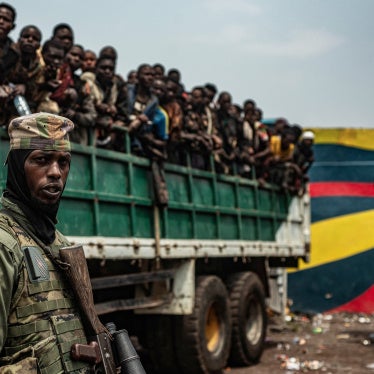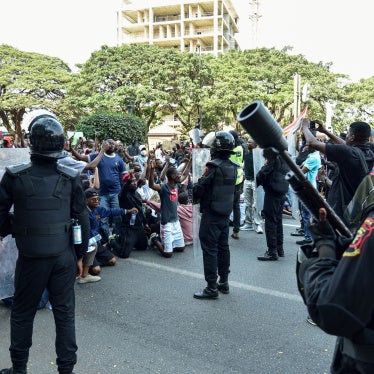(Nairobi) – The Kenyan police and military should stop using illegal mass-round-ups and beatings as a substitute for proper police investigative work, Human Rights Watch said today. Attacks by suspected al-Shabaab sympathizers on the military and civilians inside Kenya do not justify violating the rights of civilians.
Five people were killed and at least 30 injured on the evening of November 24 when grenades were thrown into crowds in two incidents in Garissa, in Kenya’s Northeastern province. In a separate incident, one Kenyan soldier was killed and at least ten injured when a military truck hit an improvised explosive device (IED) in the border town of Mandera on the same day. The attack is believed to be the work of Kenyan-based sympathizers of al-Shabaab, although no one has yet claimed responsibility for the attack.
“The attacks in Garissa are shocking,” said Daniel Bekele, Africa director at Human Rights Watch. “But they do not justify rounding up whoever happened to be at the scene.”
Responding to the attacks, the Kenyan police and military arrested around 300 people in Garissa and another estimated 300 in Mandera. Witnesses told Human Rights Watch that security officers arbitrarily rounded up bystanders at the scene of the IED explosion in Mandera, which took place near the town center. Security forces arrested hundreds, including schoolchildren, and beat dozens.
One witness told Human Rights Watch: “My neighbors were beaten seriously. One man was bleeding from the head and I took him to the hospital. Soldiers were beating young, small school boys of 12, 13, 15 years… Last night we slept in fear that they were coming to beat us again.”
Mandera West MP Mohamed Maalim Mohamud told Human Rights Watch that some victims had broken limbs, and that some detainees who had been injured in beatings by police and soldiers were denied access to medical treatment.
Leo Nyongesa, the Provincial Police Officer, confirmed that around 300 people had been arrested in both Mandera and Garissa and admitted that the authorities had not found those responsible for the attacks. Some have been taken to court for entering Kenya illegally. It is not clear how many remain in custody.
Nyongesa told Human Rights Watch that an inquiry was being held into allegations of mistreatment of people by the police and military. He would not state who was conducting the inquiry, but said any member of security forces found to be responsible for human rights abuses would be disciplined.
Arbitrary arrests of large numbers of people - such as when there is no evidence to believe they are suspects in a crime - is a serious violation of the human rights of the detainees and unlawful detention should be treated as a crime in itself.
“A nation that respects the rule of law does not arbitrarily detain hundreds of people for the crimes of a few,” said Bekele. “Kenya needs to win the confidence of its citizens, not alienate them further. It should start by demonstrating a zero-tolerance policy for security agents who mistreat civilians.”
Sustained police intelligence work is required to address the attacks, not mass arbitrary detention, Human Rights Watch said. The round-ups follow arbitrary detentions and beatings in Garissa on November 11 in which people were apparently arrested solely on the basis of their Somali appearance.
Background
Kenya invaded Somalia in pursuit of the Islamist militia al-Shabaab on October 16. Al-Shabaab promised to retaliate. A series of attacks since then in Nairobi and Kenya’s Northeastern province have targeted both military units and civilians.








